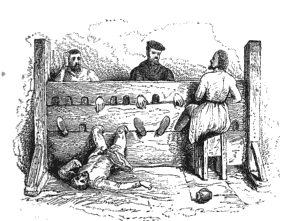Did you ever run across the old children’s book called “Mr. Happy”? His story goes like this: one day he leaves his very happy home and goes walking in the neighborhood. He finds a door and wonders to himself, “who lives here?” When he goes through the door he is led down a long staircase and into the room where Mr. Miserable lives. Mr. Happy leads Mr. Miserable out of the room, up the stairs and back to his home, where Mr. Miserable stays for some time. Over the time he is there, Mr. Happy begins to rub off on him and one day Mr. Miserable finds himself beginning to do something he has never done before. He smiles. The story ends with the lesson that if we’re ever miserable, we can fix it by smiling!
Isn’t that precious? And maybe a bit delusional?
Yes, there are some people who actually can “fix” themselves just by turning their frown upside down. I don’t know how that works. Either they have such optimism that they can will themselves happy, or they live in such denial that they can smile past anything. Privately, I am envious of those people. We need them, so the rest of us don’t pull the whole ship down.
But those people — the naturally giddy ones — are not most of us. Most of us are moody. We are stressed out and confused about our lives and the lives of people we live with. We deal with real depression, real anxiety, real mood disorders. Many of us chronically feel like we’re running just to keep up. So how do messages about joy work for real people like us, whose lives are a little more complicated than Mr. Happy? How do we do this thing called reality without it looking like a Hallmark card? How does joy mesh with stress and broken dreams and broken relationships and the death of people we love and the kind of anxiety and depression that goes deeper than a bad mood or a bad day?
Here’s my real question: how does what we read in the Bible about joy make sense if you’re on Prozac or worse yet, if you’re not, but should be? If Jesus said, “I came that you might have joy, and that you might have it to the full,” then how do I acquire that inheritance? Here’s what I believe: I believe biblical joy is not only attainable, but is the normal state of the Spirit-filled life. Christians are meant to grow in joy. And as we’ve already said, maybe your temperament or approach to life or other circumstances makes this more of a challenge for you.
But as a follower of Jesus, filled with the Holy Spirit, it is your inheritance. And there are things we can do to clear the channel so we have the most opportunity to experience the fruit of the Spirit-filled life.
Let’s start with a definition. What is biblical joy?
1. Joy is a spiritually generated response to God’s goodness.
2. Joy is a deep-down assurance that the quality of my life is not rooted in my feelings or circumstances but in the love, cover and hope of a good and faithful God.
3. Spiritual joy comes from a deeper place than our everyday emotions, which are also gifts from God. The difference is that emotions don’t have roots, but spiritual fruit does.
4. Joy is a natural fruit of the Spirit-filled life.
There are barriers to joy, just like there are barriers to grace. We let things, like sin, self and circumstances to get in the way of the flow of joy. And one of the most painful blocks to joy is unforgiveness.
The first habit of joyful people is that they forgive easily. We know this, because forgiveness is the cornerstone of our faith. God’s seminal statement to humanity at the most critical moment in the world’s history was the statement he made at the cross. And that statement was simply (profoundly) this: I forgive you. Joy begins at the cross!
Ephesians 4:21-24 reads, “when you heard about Christ and were taught in him in accordance with the truth that is in Jesus. You were taught, with regard to your former way of life, to put off your old self, which is being corrupted by its deceitful desires; to be made new in the attitude of your minds; and to put on the new self, created to be like God in true righteousness and holiness.”
Malcolm Gladwell has written a book called “Blink,” about the thousand decisions we make every day in the smallest slices of time — choices we make in split-seconds during a conversation — that determine how we respond to life at the subconscious level. Gladwell interviewed one psychologist who has made a study of watching couples in conversation. This guy has become so adept at watching their non-verbal communication that he can tell with incredible accuracy how likely they are to divorce, after just a few minutes of watching them talk. His point is that how we react to other people in the briefest moments even non-verbally says a lot about what’s beneath the surface.
This psychologist has boiled hundreds of facial expressions down to four major categories. He calls them the Four Horsemen: defensiveness, stonewalling, criticism and contempt. And he says the real killer among those four is contempt.
He says, “You’d think criticism would be the worst, because it maligns character. But contempt is worse, because it puts one person above another. It’s when we look down on another person that we do the most damage.” And it is so damaging, the psychologist says, that it affects our immune system.
Contempt is a killer. No wonder the enemy of our souls has made a career out of getting us to go there. He wants us to make pecking orders. To make ourselves better than others. The enemy has made quite a career out of doing nothing more than keeping your heart hard toward another human being. And it is brilliant, really. He can make it slice both ways, so we feel chronically inadequate while we’re tearing others down so they never feel good enough, either.
That’s the tactic of the enemy of our souls.
In his teaching on forgiveness, Chuck Swindoll asks some good questions:
• Do you free people, or do you hold them hostage?
• Do you relieve them of guilt and shame, or do you increase their load?
• Do you encourage others or discourage them?
• Do you find yourself participating in the world of construction or the world of destruction?
• Do you point out people’s faults and failures or their strengths and accomplishments?
Paul says that if we’re going to practice true, deep-down forgiveness, we have to find a new way of seeing our circumstances so that we cultivate a spirit of honor.
Go with me to Mark 10:17-22. This is how Jesus did it. He didn’t wait for a person’s behavior to straighten up. He learned to love people right where they were, before they got it all right. And this is what it looks like to walk in forgiveness, and this is the difference between walking in deep-down, New Testament forgiveness and simply “letting it go.” Walking in forgiveness requires that we keep our hearts open, that we engage the practice of love, not as a feeling but as a discipline.
How can I practice repentance and renewal in my life?
Name your spirit of offense. This is what it means to confess your sins. If you won’t name it before the God who already knows it, he is not likely to heal you of it. Sometimes, I suspect God waits for us to name our sin so we can hear ourselves say it … so we can acknowledge our part in our own pain. God is good about asking us to take responsibility – to grow up.
Pray daily for the person who has offended you until you sense your outlook changing. I learned this from Jerry Varnado, a friend in ministry. When Jerry’s wife left him on the day of his best friend’s funeral, he was mad. Probably should have been. But over time that anger settled in and became bitterness. Does that sound familiar? This is what Paul means in Ephesians when he says we can be angry, but we don’t have permission from Jesus to sin. Anger is a feeling. Bitterness is a sin. It has a root to it, a root that will choke out the roots of spiritual fruit. Bitterness separates us from God.
Finally, a friend told him to spend two weeks praying for his ex-wife. And not to pray that God would smite her or make her understand or change her in some way. But to pray God’s best over her. He said the first time he prayed that prayer, it sounded something like this: “God, I know you know I don’t really mean this, but I’m praying God’s best over my ex-wife. Amen.”
Every day, he prayed a prayer like that. At the end of the first week, he was able to leave off the part about not really meaning it. At the end of the second week, the anger was gone. Did it mean everything was great for them from then out? No. But things were better for Jerry.
Lewis Smedes in “The Art of Forgiving,” says, “the first and sometimes only person to get the benefits of forgiving is the person who does the forgiving.” I want to ask you to think honestly about this: Is there a bitter root in you? Is there someone who has offended you, recently or years ago, who you’ve not been able to release? If you are not ready to go make peace with someone and if you find yourself harboring anger, and if you don’t know what to do with that, then start with prayer.
Ask yourself: what one good quality in this person’s life can I begin with as I pray? Never mind whether they deserve it or not. Here’s the thing. When it comes to grace, “deserve” has nothing to do with it. Smedes says, “of course he does not deserve to be forgiven. Nobody does. (Even) being sorry for the wrong we did does not earn us a right to be forgiven. There is no such thing as a right to be forgiven. Forgiving flows always and only from what theologians call grace — unearned, undeserved favor.”
Joy flows from the same well as grace. And it begins with repentance and renewal. If I’m going to learn Christ and embrace the new life he offers, I have to let go of the old life, the lower existence. And a key piece in learning Christ is learning to walk in forgiveness. This is the difference between reacting and responding. To put it plainly, I have to learn to discipline my emotions, especially the emotion of anger, so it doesn’t create opportunity for sin in my life.
This new life that Paul talks about (that we learn from Christ) will call us to take every thought captive, including the angry ones. Part of learning how to respond in adult ways to painful things is learning to deal directly and honestly with others. I really think this is right at the heart of what Paul means when he says in this next verse …
In Ephesians 4:29, Paul wrote, “do not let any unwholesome talk come out of your mouths, but only what is helpful for building others up according to their needs, that it may benefit those who listen.” Paul isn’t suggesting here that we make ourselves into a doormat — allowing ourselves to be abused, over and over, by the same people. It just means that in our conversations with those who hurt us, we learn the language of grace.
I saw this in a post by Ann Barab, on the habits of joyful people. She says we create our own unhappiness with our JUNK:
• Judgments – criticism. One of the four horsemen that shows up in our facial expressions, even when we don’t realize it. Judgment is a slippery slope that leads too easily into contempt.
• Unforgiveness – carrying a spirit of entitlement; you can’t grow humility and unforgiveness in the same spirit.
• Negativity – Barab says it takes no skill to be negative.
• Know-it-all-ness – another way of expressing defensiveness and contempt.
How much JUNK are you carrying around? Barab says these are the biggest obstacles to joy. And the real courage comes in forgiving completely, from the heart, as God in Christ has forgiven us. Living an authentic Christian life depends on this point.
“Be kind and compassionate to one another, forgiving each other, just as in Christ God forgave you” (Ephesians 4:32).That’s the bottom-line reason for any act of forgiveness we offer: We do it because we’ve been forgiven for all the rascally, stupid, short-sighted, downright-mean things we’ve done in our lives, and it may be that until we have received that forgiveness from God, we aren’t able to truly forgive anyone else. So hear this: Christ looked on our sin and forgave us for all of it. What we’ve received for ourselves, we use to relieve others, so they don’t have to bear shame and guilt, either.
We’ve talked about two practical ways to clear the channel for joy: Name your spirit of offense. Pray daily for those toward whom you have unforgiveness. How else can we practically support our quest for joy?
1. Seek help from others. Sometimes what we need most is another perspective. David Seamands says that when we are angry or depressed, our perceptions change. A little hill becomes a great mountain. But real friends can help you see its true height in perspective. And it helps, too, to remember that not everyone around us is against us. Its so easy to get the Elijah Syndrome going … “I’m the only one like me. There’s no one else who understands.” That’s one of the things we naturally do when we are angry, upset or depressed – we instinctively build walls to protect ourselves. When you have a wall of anger around you, then it is hard to walk up and love on you. Reach out. Do the thing you least want to do.
2. Sing! Make music. I used to call Steve “the singing bush,” because especially when he was dealing with depression, he sang incessantly. Drove me nuts. Until I started dealing with some obsessive thought patterns and realized I couldn’t will myself to stop thinking what I was thinking. One day, I heard myself singing and realized that when I sing, even if the rest of the world suffers, I feel better. Now I intentionally work to keep a song going in my head all the time. And you know what? Its such a simple thought, but it works. If you can’t stop being angry at someone, try singing the thought out of your head. That’s what David did. That’s where a lot of those psalms came from. He chose in the midst of his anguish to praise the Lord.
3. Remember and give thanks. This one is related to singing, but different. With this one, we are choosing to look at things differently. We are choosing, like Joseph, to see the big picture – to say, “maybe the world meant to hurt me, but God means nothing but good from this.” God can use anything, God can make good out of anything. I was talking to someone recently about a painful memory, and she said, “you know, in a weird way, I’m glad for it now.” I understand that. When we accept the power of Christ in our lives, we begin to get it that he can make good out of anything. Anything. We’ll talk more about this next week.
4. Lean heavily on the power of God’s Word. Because here’s what I’m learning about scripture and about Jesus and about all the things we teach and say: it works. God’s Word is exactly what it promises to be. It is good news for the poor and release for the captives. It really is a way for blind people to see and the very power of God for salvation. If God asks us to forgive our enemies and those persecute us, its because he wants nothing less for us than joy. Jesus says as much (John 15:11). And if God tells us that we can’t be in communion with him so long as we harbor anger and unforgiveness in our hearts, he tells us that because He knows it to be true. He knows what we’re made of and he knows what we’re made for. I came, Jesus said, that my joy might be in you, that your joy might be full.






